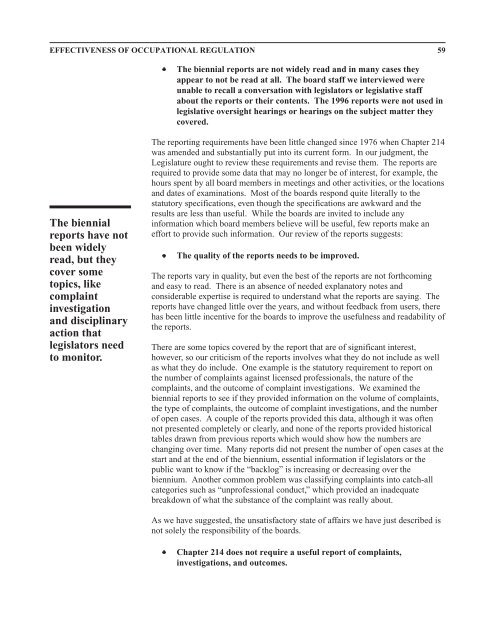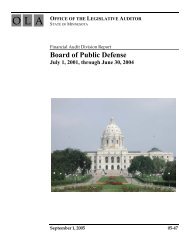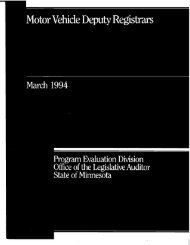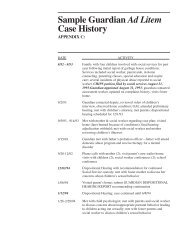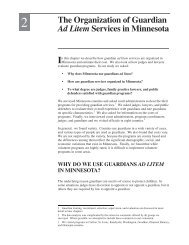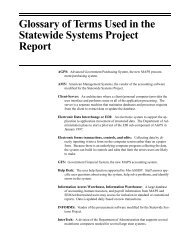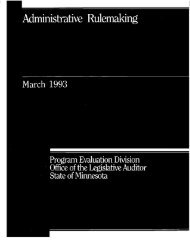Occupational Regulation - Office of the Legislative Auditor
Occupational Regulation - Office of the Legislative Auditor
Occupational Regulation - Office of the Legislative Auditor
You also want an ePaper? Increase the reach of your titles
YUMPU automatically turns print PDFs into web optimized ePapers that Google loves.
EFFECTIVENESS OF OCCUPATIONAL REGULATION 59<br />
· The biennial reports are not widely read and in many cases <strong>the</strong>y<br />
appear to not be read at all. The board staff we interviewed were<br />
unable to recall a conversation with legislators or legislative staff<br />
about <strong>the</strong> reports or <strong>the</strong>ir contents. The 1996 reports were not used in<br />
legislative oversight hearings or hearings on <strong>the</strong> subject matter <strong>the</strong>y<br />
covered.<br />
The biennial<br />
reports have not<br />
been widely<br />
read, but <strong>the</strong>y<br />
cover some<br />
topics, like<br />
complaint<br />
investigation<br />
and disciplinary<br />
action that<br />
legislators need<br />
to monitor.<br />
The reporting requirements have been little changed since 1976 when Chapter 214<br />
was amended and substantially put into its current form. In our judgment, <strong>the</strong><br />
Legislature ought to review <strong>the</strong>se requirements and revise <strong>the</strong>m. The reports are<br />
required to provide some data that may no longer be <strong>of</strong> interest, for example, <strong>the</strong><br />
hours spent by all board members in meetings and o<strong>the</strong>r activities, or <strong>the</strong> locations<br />
and dates <strong>of</strong> examinations. Most <strong>of</strong> <strong>the</strong> boards respond quite literally to <strong>the</strong><br />
statutory specifications, even though <strong>the</strong> specifications are awkward and <strong>the</strong><br />
results are less than useful. While <strong>the</strong> boards are invited to include any<br />
information which board members believe will be useful, few reports make an<br />
effort to provide such information. Our review <strong>of</strong> <strong>the</strong> reports suggests:<br />
· The quality <strong>of</strong> <strong>the</strong> reports needs to be improved.<br />
The reports vary in quality, but even <strong>the</strong> best <strong>of</strong> <strong>the</strong> reports are not forthcoming<br />
and easy to read. There is an absence <strong>of</strong> needed explanatory notes and<br />
considerable expertise is required to understand what <strong>the</strong> reports are saying. The<br />
reports have changed little over <strong>the</strong> years, and without feedback from users, <strong>the</strong>re<br />
has been little incentive for <strong>the</strong> boards to improve <strong>the</strong> usefulness and readability <strong>of</strong><br />
<strong>the</strong> reports.<br />
There are some topics covered by <strong>the</strong> report that are <strong>of</strong> significant interest,<br />
however, so our criticism <strong>of</strong> <strong>the</strong> reports involves what <strong>the</strong>y do not include as well<br />
as what <strong>the</strong>y do include. One example is <strong>the</strong> statutory requirement to report on<br />
<strong>the</strong> number <strong>of</strong> complaints against licensed pr<strong>of</strong>essionals, <strong>the</strong> nature <strong>of</strong> <strong>the</strong><br />
complaints, and <strong>the</strong> outcome <strong>of</strong> complaint investigations. We examined <strong>the</strong><br />
biennial reports to see if <strong>the</strong>y provided information on <strong>the</strong> volume <strong>of</strong> complaints,<br />
<strong>the</strong> type <strong>of</strong> complaints, <strong>the</strong> outcome <strong>of</strong> complaint investigations, and <strong>the</strong> number<br />
<strong>of</strong> open cases. A couple <strong>of</strong> <strong>the</strong> reports provided this data, although it was <strong>of</strong>ten<br />
not presented completely or clearly, and none <strong>of</strong> <strong>the</strong> reports provided historical<br />
tables drawn from previous reports which would show how <strong>the</strong> numbers are<br />
changing over time. Many reports did not present <strong>the</strong> number <strong>of</strong> open cases at <strong>the</strong><br />
start and at <strong>the</strong> end <strong>of</strong> <strong>the</strong> biennium, essential information if legislators or <strong>the</strong><br />
public want to know if <strong>the</strong> “backlog” is increasing or decreasing over <strong>the</strong><br />
biennium. Ano<strong>the</strong>r common problem was classifying complaints into catch-all<br />
categories such as “unpr<strong>of</strong>essional conduct,” which provided an inadequate<br />
breakdown <strong>of</strong> what <strong>the</strong> substance <strong>of</strong> <strong>the</strong> complaint was really about.<br />
As we have suggested, <strong>the</strong> unsatisfactory state <strong>of</strong> affairs we have just described is<br />
not solely <strong>the</strong> responsibility <strong>of</strong> <strong>the</strong> boards.<br />
· Chapter 214 does not require a useful report <strong>of</strong> complaints,<br />
investigations, and outcomes.


